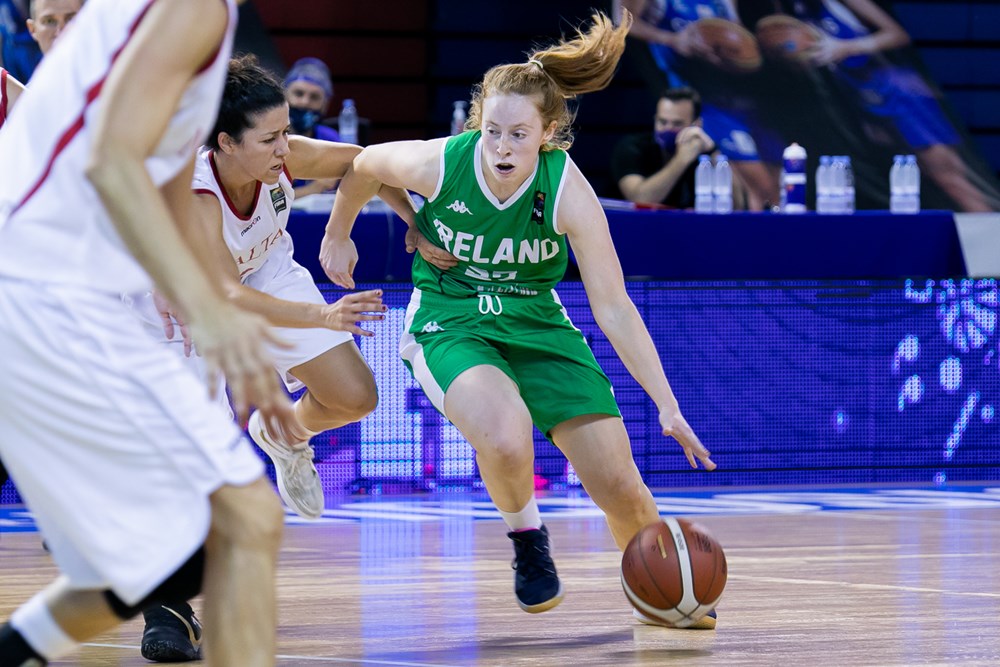
With the men taking gold in Dublin and silver for the women in Cyprus at the 2021 FIBA European Championships for Small Countries, Emmet Ryan explains what a return to the main international qualification pool would look like for Ireland
Two things to bear in mind before we get to the nitty gritty. No formal announcement has been made by Basketball Ireland, indeed not even an informal one for that matter, about the next steps for the senior programmes.
The other thing to bear in mind is that the formats for Eurobasket 2025 (men) or Eurobasket 2023 or 2025 (women) qualification haven’t been finalised. With that said, here we go.
A drawn out process for the men
Going entirely from the format used for the 2022 men’s Eurobasket, the likely format would see Ireland enter the pre-qualification stage. This automatically represents a step-up in the standard of competition.
Teams Ireland could meet include familiar foes from friendlies such as Slovakia and Luxembourg. Albania would likely also be there, the side directly above Ireland in European rankings but one that didn’t consider entering the Small Countries. The strongest likely team at such a stage of the competition would be Portugal, the 33rd ranked team in the whole of Europe.
This stage will, most likely, comprise of 9 or 10 teams split into groups of 3 or 4, playing home and away fixtures spread out over international breaks across a full season. Last time around, the qualifiers began the first break after Eurobasket ended. Even with the shortened gap, that would still probably mean Ireland’s men would be looking at international breaks in November 2022, February 2023, and June 2023.
The top four sides from this stage would go through to conventional Eurobasket qualification. Ireland would not be expected to progress based on FIBA rankings, although they are hilariously flawed, but that would not be the end of their participation. In the unlilkely event Ireland did progress, it would enter in the final pot for main qualification which would likely involve international windows but also a compressed format due to adjustments for Covid. Basically, it’s bad guess work at this stage to prognosticate.

Jordan Blount celebrates after Ireland won the 2021 FIBA men’s European Championship for Small Countries.
The parachute
If Ireland don’t get a top four spot, they enter the third round. If they get a top four spot, they enter the second round. This sounds confusing and it is. Basically, the better sides enter a stream with teams eliminated from World Cup qualification while the weaker sides have to wait out for the eight teams eliminated from round two who also get a second bite at the cherry.
A top four sport in the first phase would be worse for the calendar, as it would mean international breaks in late 2023 and early 2024 whereas bypassing that would just mean a summer international schedule in 2024, most likely. With the wobble in schedule caused by Covid, this is a little wonky. It is extremely unlikely Ireland would progress past this stage in any event so it’s easiest to use this as a stopping point.
The calibre of opponent would increase again in any event with the strongest being teams around the level of Great Britain or Hungary, both of which are sides that expect to qualify for every edition of Eurobasket.

Dayna Finn in action for Ireland against Kosovo at the 2021 FIBA women’s European Championship for Small Countries.
The slight complication with the women
Formal entry for Eurobasket 2023 qualification hasn’t officially been announced as closed anywhere but it’s still safe to assume Ireland won’t seek to enter it so soon, particularly if FIBA returns to the even numbered format with the Small Countries as it would grant Ireland one more shot at that level while still making the step up at the same time as the men.
So let’s assume 2025
The task for the women is even harder than for the men despite the greater success at underage level in recent years. That’s because of the final number of teams at Eurobasket being 16 for women as opposed to 24 for men. There’s a reasonable argument that FIBA will eventually expand to have the two tournaments match but it’s not clear if it’s even on the agenda for FIBA at present so we have to assume 16 teams in the final tournament.
In that instance, the best resource to check is how teams qualified for Eurobasket 2021. The big upside with the women’s game is that Eurobasket remains biennial whereas it is only quadrennial for men.
This will be a lot less complicated a format and a whole lot tougher for the Irish team from the off. Everyone goes in at the same group stage so qualification works the same as it does for major football tournaments.
This would mean Ireland’s women would expect to be fourth pot of four in qualification with the likes of Estonia, Finland, and Albania in the same pot. Ireland’s current ranking and the basic lack of ranking games, or sufficiently high ranking ones, between now and the 2025 qualification means this spot is a certainty now.
This could deliver a group with Spain, Great Britain, and Germany as the other opponents based on current rankings. That’s the group of death scenario but not impossible and shows the difference in what to expect with this format.
The smaller number of teams qualifying for the finals and the greater frequency of the women’s competition means the women would face more good teams more often than the men.
It would also mean three simple qualification windows, the winter of 2023, spring of 2024, and winter of 2024, with home and away games. Crucially, if Ireland chooses to make such a step up with the women it would get another shot at such play in the winter of 2025. The break would be far less than the men would have to deal with.

Sorcha Tiernan in action for Ireland against Malta at the 2021 FIBA women’s European Championship for Small Countries.
In summary
The road to re-entering European basketball is still a little muddy in terms of format because of Covid but it would certainly involve some international breaks in-season. These are generally mandated by FIBA as it stands so entering such a format would require the top tier leagues in Ireland to pause, it wouldn’t be a matter of choice.
That will naturally be a point of debate going forward but I’ve deliberately avoided the yes or no debate as to whether Ireland should make the step up now as I’m saving that for part of a wider piece.




Leave a Reply